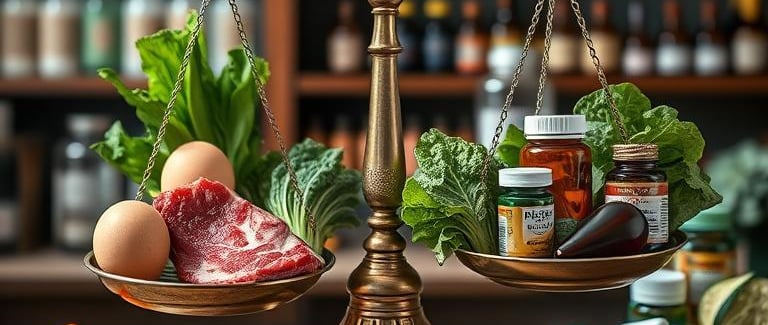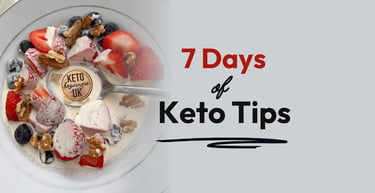To Supplement Or Not To Supplement?
Why Keto Quick Fixes and Shortcuts Can Backfire
Lisa Cherry Beaumont, Ketogentility.co.uk
10/30/20254 min read


(As an Amazon Affiliate, any purchases you make through my links may result in me earning about 3 sterling pence which of course keeps me in Lambourghinis and Louboutins but costs exactly the same to you - I do appreciate you using my links where possible. Thanks so much.)
If you’re reading this, chances are you already question the conventional medical route - the pills, the procedures, the “there’s a drug for that” mentality. You know deep down that health isn’t something you can outsource to a prescription.
But even those of us who’ve broken away from that system can still get caught by the same mindset in subtler ways. Instead of popping pills, we start popping supplements.
It looks different - and yes, it often feels better - but it’s the same underlying habit: trying to add something in rather than asking why something’s missing in the first place.
My Wake-Up Call
During perimenopause, I reached a point where I felt completely overwhelmed. Everything in my life was the same as it had been for months, yet I couldn’t seem to face the day without a heavy sense of dread. Rationally, I knew I wasn’t overworked - but emotionally, it felt like I was drowning.
At the time, I wasn’t keto. I hadn’t yet discovered the power of a truly nourishing, animal-based diet. So I did what most people do: I tried everything else.
Eventually, I happened upon two supplements that, quite magically, removed all those feelings of overwhelm within two days. Just like that, I was back. Energy restored. Mood lifted. Brain clear.
I could have stayed on those supplements forever and called it a win. But I’m the curious sort and needed to know why I was deficient in the first place, and how I could close that gap using food. Had I simply kept taking those supplements without digging deeper, I might have masked the root cause and left other underlying deficiencies to quietly develop into future health problems.
That curiosity was the start of my keto journey in 2022, and the ethos that underpins everything I teach today: food first.
The Modern Health Shortcut
In my Facebook group, I see people reaching for electrolytes all the time, and don’t get me wrong, electrolytes are important. But when someone says they’re feeling tired or dizzy, and the knee-jerk response is to buy a supplement, I would be remiss of me not to ask: what is your diet like?
If you’re eating a whole-food, animal-based diet, salting your food properly, and getting enough minerals from real food, you shouldn’t need to rely on supplementation - irrespective of what a keto influencer is telling you. Supplements can help temporarily, but when they become the default, we’re missing the point.
As Edward A. Goeke, author of Contraindicated: A Closer Look and Revision of Mainstream Health Axioms That Have Perpetuated Illness, Disorder, and Disease for Over a Century, reminds us: the food we eat is of primary concern, although we must take care not to throw the baby out with the bathwater when it comes to supplementation, whether pharmaceutical or “natural”. He asserts, “if you’re exhibiting an extreme deviation away from what we evolved to express genetically, phenotypically speaking, then you may very well expect it to get so bad that you need another deviation, an externality that deviates away from what we were used to, to get back to a normal equilibrium.” In simple terms: when the body has strayed far from its evolutionary design, shortcuts may be necessary - but they should always point us back to food, not replace it.
Other Common “Health Shortcuts”
Electrolyte Powders: Often used without understanding what minerals they contain or why they’re needed. Usually a sign that the diet is under-salted or under-fuelled.
MCT Oil: A favourite in keto circles, people love the instant ketone boost. But if you’re relying on it for energy instead of becoming fat-adapted, you’re chasing smoke instead of building the fire.
HRT (Hormone Replacement Therapy): Brings undeniable relief for many women, but it often masks deeper issues, such as nutrient deficiencies (zinc, iodine, selenium, cholesterol, B vitamins) that disrupt hormone balance in the first place. The symptoms return later in a different form.
Magnesium & Vitamin D: Both can be life-changing, but long-term low levels usually point to deeper dietary or lifestyle gaps, like poor fat absorption, lack of sunlight, or over-reliance on processed foods.
Probiotics: Taken to “fix the gut,” yet the gut won’t truly heal until inflammatory foods are removed and proper nourishment is restored.
None of these things are bad. In fact, they can be incredibly helpful when used thoughtfully. But they’re not the solution; they’re the stopgap.
The Real “Fix”
True health isn’t about managing symptoms; it’s about building a body that doesn’t need constant rescue. And that begins with real food - the kind of food your body instantly recognises and knows what to do with.
Every supplement, oil, or capsule that helps you feel better is a clue; a signpost pointing towards what your body’s missing. The real power lies in following that trail back to the source, not in endlessly buying more bottles.
When we treat food as medicine, and stop trying to outsmart our biology, health stops feeling like hard work and starts feeling like home - and that's the principle that runs through how I teach keto.
If you're an absolute beginner to keto, or you're returning to keto after you fell off, it's important you learn the fundamentals I teach so that you are correctly set up from the get-go.
If you don't have it already, I strongly recommend you check out my 28-Day Guide & Journal for the very best chance of success on your keto journey.
If you're looking for a quick-fix, temporary weight-loss solution, this isn't the place for you. But if you're on board with finally learning the keys to health and weight regulation that have alluded you and kept you yo-yo-ing your whole adult life, I've got you covered.
Lisa@ketogentility.co.uk
© 2025. All rights reserved.


